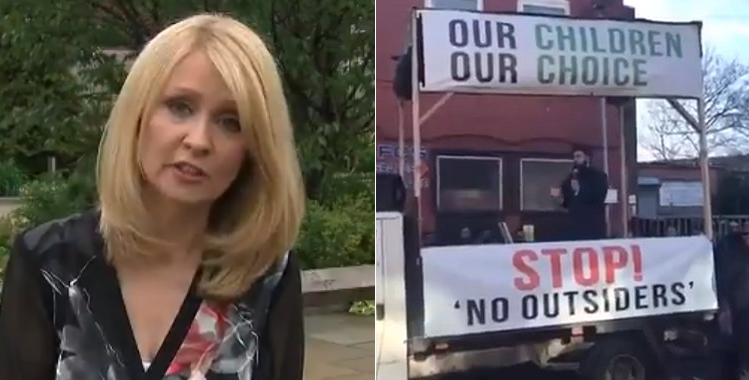Tory leadership hopeful Esther McVey says parents should have ‘final say’ over LGBT-inclusive lessons
As homophobic protests continue outside schools in Birmingham, the Work and Pensions Secretary has come out on the side of parents.
By Will Stroude

Words: Will Stroude
Tory leadership hopeful Esther McVey as said parents should have the “final say” over whether their children are taught about the existence of LGBT families in school.
As homophobic protests against LGBT-inclusive lessons continue at schools across Birmingham, the Secretary of State for Work and Pensions – who recently announced her bid to replace Theresa May as Conservative party leader and Prime Minster – told Sky News that parents should be able to withdraw their children from lessons that acknowledge the existence of LGBT people.
“I believe parents know best for children. And whilst they’re still children – and you’re talking there in primary schools – then really the parents need to have the final say in what they want their children to know,” McVey said.
“Parents know best for their children.”
When asked about protests over LGBT classes, Tory leadership candidate Esther McVey told #Sunrise parents should have “final say on what they want their children to know”.
Teachers are in tears as the row worsens: https://t.co/N8qwCQBkcA pic.twitter.com/Dmo5KGEyUV
— Sky News (@SkyNews) May 30, 2019
“People shouldn’t be protesting outside primary schools. That’s young primary school children going into schools there. Everybody has to be a little bit more adult, a little bit more grown-up in what they do outside primary schools.”
The 51-year-old former television presenter, who was first elected to parliament in 2010, added:”I’m being very clear: the final say is with the parents. And if parents want to take their young children – that’s primary school children – out of certain forms of sex education, relationship education, then that is down to them.”
In recent months, parents at several schools across Birmingham have been withdrawing their children en mass from classes and staging public protests over ‘No Outsiders’, a programme of lessons teaching children respect and tolerance relating to the characteristics included in the Equality Act. The lessons do not include any form of sex education.

Some teachers at schools currently being subjected to protests have received personal threats since the row began, with many schools suspending the lessons until a resolution is reached.
Last month, Education Secretary Damien Hinds backed schools teaching LGBT-inclusive classes, saying that the requirement for schools to consult with parent over the content of lessons “does not provide a parental veto on curriculum content.”
However, sources have told Attitude that many staff feel abandoned by the government as protests and walkouts continue to make schools increasingly ungovernable on a day-to-day basis.
Under recently-approved government legislation, primary schools across England and Wales will be required to provide LGBT-inclusive ‘Relationships Education’ for all pupils from September 2020.
What do the incoming sex and relationship education guidelines actually say?
The new legislation will introduce statutory ‘Relationships and Sex Education’ (RSE) in all secondary schools in England, and statutory ‘Relationships Education’ in all primary schools, with a new emphasis on LGBT content.
The strengthened LGBT section of the guidelines explicitly state that for both RSE and, importantly, Relationship Education (the kind being covered at primary level), “schools should ensure that the needs of all pupils are appropriately met, and that all pupils understand the importance of equality and respect.”
It adds: “Schools must ensure that they comply with the relevant provisions of the Equality Act 2010, under which sexual orientation and gender reassignment are amongst the protected characteristics.”
Despite the greater clarity the new policy brings, however, even these guidleines leave plenty of wiggle room for schools who might be reluctant to cover LGBT topics.

While insisting “all pupils” must be taught LGBT content at a “timely point” as part of a fully-integrated curriculum (i.e., you can’t just have one lesson on the gay stuff), they say this can be left until “the point at which schools consider it appropriate.”
In addition, the new rules allow “flexibility for schools in their approach, including for faith schools to teach within the tenets of their faith.”
As under current guidelines, parents will have the right to withdraw their child from sex education, but now teens will have the right to ‘opt-in’ themselves as they approach age 16.
However, that withdrawal power wil not extend to relationship-only education, which importantly would now include LGBT acceptance and diversity.
